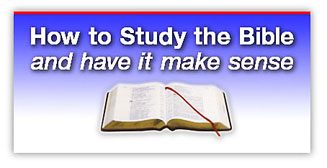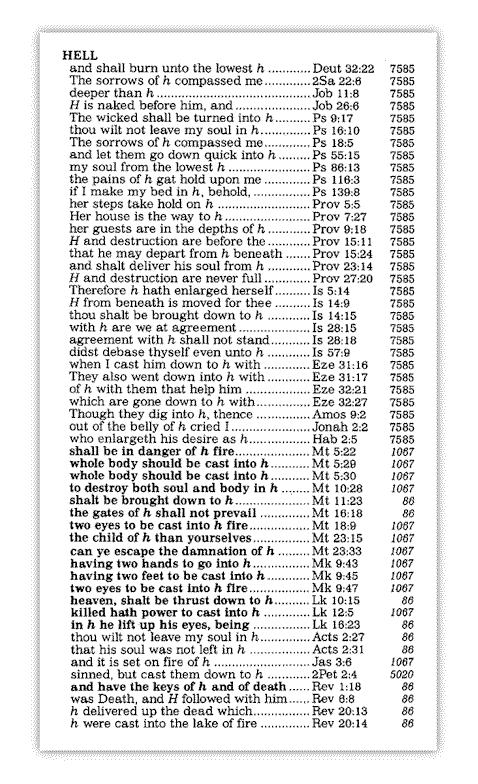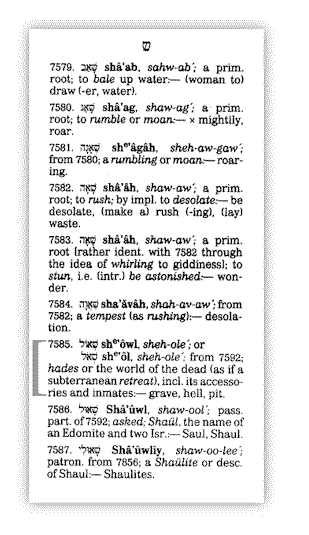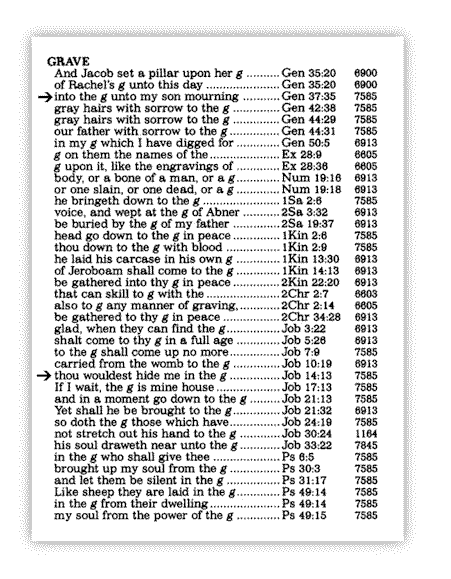|
|
||
 ASK any Bible question, get Bible ANSWERS from a real person, DISCOVER more about your Bible! |
||
[Go to Intro] [Go to Study by Symbol] Click
here to download the ebooklet now
Examination of every Scripture on a single subject was once an impossibility. Now it is relatively easily accomplished. The necessary help is available in either of two large books: Strong’s Exhaustive Concordance and Young’s Analytical Concordance Each of these books lists every word in the King James translation of the Bible, sometimes called the Authorized Version. Also listed are the Hebrew and Greek words from which they come (with definitions) and other ways in which these same words are translated. Libraries and good bookstores regularly have copies of Strong’s and Young’s Concordances.* As an example of the kinds of benefits reaped from exhaustive topical comparison, note what happens when the traditionally controversial subject of hell is examined. Below is the listing of "hell" as found in Strong’s Concordance. Note immediately that every occurrence of hell in the Old Testament is a translation of a single Hebrew word (sheol) as represented by number 7585 in the right-hand column. Note the definition as reproduced from the lexicon of Strong’s Concordance shown on page 13. * Exhaustive Concordances are now available for a number of translations and are frequently also available on computer programs. Some newer versions have been abridged and are therefore missing some important information. Be sure to obtain an "unabridged version" to make the most of your studies.
Following the colon and dash (:-), Strong’s Concordance lists the other ways that this same Hebrew word (sheol) is translated in the King James version. It is interesting to learn that the translators occasionally rendered this word "grave" and "pit." Finding this information, it is now important to look up grave and pit to see the Scriptural usage of these words since they are still a definite part of our topical study on hell. Strong’s Concordance lists the usages of grave and pit as follows: [look for number 7585]
Look in the right-hand column for number 7585. (This, remember, means that the Hebrew word sheol is the word being used.) This reveals the interesting fact that good men expected to go to hell! Genesis 37:35 shows that Jacob expected to go there and that he thought his favorite son was there! Job 14:13 shows that Job actually prayed to go to hell to escape God’s wrath! Is the value of this kind of study becoming clear? Without pursuing the matter further, it should be becoming clear that the teaching of hell as a place of eternal torment is contrary to the Scriptures — when they are studied exhaustively and impartially! If this matter is studied to its logical conclusion, it will be found that the word "oblivion" is the best synonym for the Hebrew word sheol and its Greek (New Testament) counterpart, hades. Hell is not eternal torment; it is oblivion. It is not only for the wicked; it is also for the good. It is not permanent; it is a temporary oblivion, or non-existence, or death-state. (For a detailed examination of every Scripture on Hell, see our publication Where are the Dead?) It is interesting to note that such an old and large denomination as the Church of England has recently accepted the validity of this definition of hell. Another Example
Arranged below are three columns of Scriptures which contain the word "earth." These samplings are purposely listed in three columns to point out the seeming contradictions. One column contains Scriptures which state that the earth will be destroyed. The second column contains texts which show that the earth will not be destroyed. The last column entries imply that there will be a new earth. Read these texts before proceeding:
This listing is still based on the idea that an examination by TOPIC is of foremost importance. From this chart, however, it is clear that topical study by itself is not always adequate to eliminate contradiction. Note the importance of two more methods of Scripture study: study of symbolic language and study by Time Frame. |
© BibleToday.com




